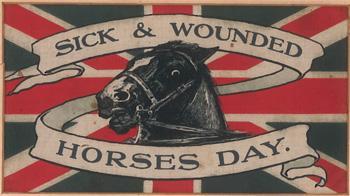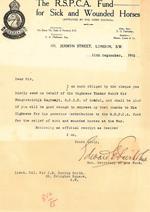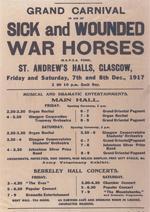Fund for sick and wounded horses
Within weeks of war being declared we started the Fund for 'Sick and wounded horses', which raised over £250,000 (the equivalent of over £12 million today) between 1914-18. The King even made a donation.

Helping horses in war
The money raised was spent on four complete field veterinary hospitals, each one of which was able to hold up to 2,000 horses and mules, and paid for stabling at eight other veterinary hospitals.
We helped establish forward treatment stations and equipped these with 28 motor ambulances to help injured animals get to hospitals quicker. The fund also paid for 180 horse drawn ambulances, the main form of transport for horses injured in war.
A letter from Field Marshall Douglas Haig, from the British Army, said:
"Animals have been exposed to very severe trials and hardships and have suffered heavily, not only as battle casualties, but through the exhaustion and loss of health consequent on the severe stress of work.
"Their lot has, however, been greatly lightened, and their comfort in sickness materially added to by the assistance, which the RSPCA Fund has been able to give."
Beyond first aid
As horses were being subjected to new types of warfare, including gas attacks. The fund began paying for specialist veterinary laboratory equipment and isolation units, which were vital in treating animals suffering the effects of gas attacks and burns.
During the war we didn't just provide emergency medical help. We also provided logistical support to help the AVC save and look after injured horses. The fund paid for:
- three motorised lorries to carry food and medicine,
- 50 corn crushing machines to help prepare the horses food,
- tens of thousands of waterproof loin cloths and rugs,
- sheepskins,
- 50,000 books on lameness and first aid,
- 4,000 manure skips,
- 100 iron manure trucks,
- tens of thousands of bandages,
- tons of medicines and veterinary equipment,
- hay and food for all of the horses.

International help for war horses
We didn't confine our support to British forces. The fund provided eleven motorised ambulances to the American army, as well as provided assistance to the Canadian army.
By the end of the war the Fund for Sick and Wounded Horses had become truly international, supporting activities in France, Italy, Mesopotamia, Salonika and Egypt.

